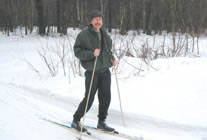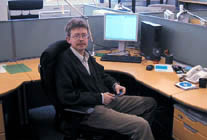Doing Experiments with My Grandma
For the past two years, Dr. Andrey Nikolaev of the internationally-acclaimed multinational Laboratory for Perceptual Dynamics has been studying the relationship between cognitive processes and electrical activity in the human brain, as reflected in electro-encephalogram (EEG). A Moscovite born in 1962, Dr. Nikolaev chose to make a career in this field of research under the influence of his grandfather and grandmother, who were both professors of physiology.
Once when he was twelve, while at his family's summer villa, his grandmother called him and said, "Andrey, please go to the pond and catch a big frog." Of course, the idea of going to the pond to catch frogs pleased him very much, but he had no idea why she needed a frog. He brought her the biggest one that he was able to catch. Using scissors, knitting needles, salt, and vinegar, she did a series of interesting experiments on the nerves, heart, and intestines of the frog. "Looking back now, I realize the experiments that she conducted for me were equivalent to a practical course in physiology in medical school. Although, at that time, I understood nothing, I have remembered it to this day and it's imprint has influenced me throughout my life."

Obligations after Graduating from Medical School
Several years later, in the latter half of the 1980s, just as Dr. Nikolaev was starting his career as a researcher, the Soviet Union began to break up. "My life was at the mercy of the turbulent waves of the great upheaval," says Dr. Nikolaev. "After I graduated from high school, I made my way to Moscow Medical University. Eventually I wanted to pursue deeper studies concerning the physiology of the brain." But it was not easy to achieve his goals.
"Although back then in the Soviet Union, anyone could be admitted to any state-run university for free, the law also required that all medical school graduates work as doctors in hospitals for a period of at least four years. Nobody could avoid this obligation, so I simply had to do it, even though I was unwilling." In 1990, he returned to his life as a researcher at the Soviet Academy of Science after fulfilling his obligations at the hospital, but a quiet life eluded him.
"My country was in the midst of Perestroika and soon budget cuts began affecting research programs. The scientific community in the Soviet Union was being frustrated at every turn."

A Researcher Concurrently Holding Four Jobs
According to Dr. Nikolaev, Perestroika went through two stages. "In the first stage, people had lots of money, but there was nothing to buy in the stores. In the second stage, there was a wide choice in the stores, but no one had money with which to buy anything."
"Even now, I clearly remember one day during the first stage of Perestroika, when a researcher from Japan happened to come and see me at my office in our research institute. After staying several days in Moscow, he was wondering how people managed to get anything to eat, for he had gone into several food stores but found only canned green peas."
Dr. Nikolaev admitted, "I couldn't think of anything to say in response to the Japanese researcher. All I could do was to ask my manager to give him two days' food rations from our institute." But then when the supply of food started to improve in the second stage of Perestroika, Dr. Nikolaev became the victim of soaring inflation.
"Prices were skyrocketing and salaries lost their value rapidly. I was already married and had two sons at that time. But I couldn't earn enough solely from the job at the Academy to meet the demands of being the bread-winner, so I had to do four jobs concurrently."
Besides his regular job at the Science Academy, he was involved in similar scientific research at another institute, conducted psycho-physiological research at a school for handicapped children, and drew computer graphics at an Italian architect's office.
"The first thing I did while I was commuting by subway to work every morning was to make sure what office I was expected to be in for the day," added Dr. Nikolaev with a smile that belied the hardships he must have endured.
Later on, little by little, his research work became subsidized, which enabled him to concentrate on the main focus of his studies.
Two years have passed since he began his research here at RIKEN BSI, and he expressed great satisfaction with his life here as a researcher, adding that one thought keeps recurring: "Through my experiences in Moscow and my life at RIKEN, I have come to understand the true meaning of the words 'normal conditions required for scientific research'. I believe such conditions are those in which researchers can concentrate fully on their research and nothing else. This seems obvious but it is crucially important and many researchers have painstakingly tried to obtain such conditions. Now that these conditions are a reality here at RIKEN BSI, and I deeply appreciate being able to enjoy the conditions here."





